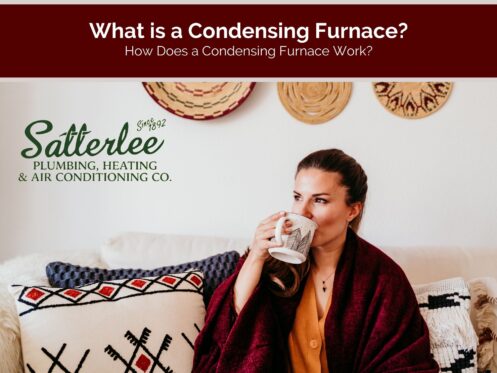A condensing furnace is an essential piece of equipment used for heating in residential and commercial buildings. It is an upgrade from traditional furnaces due to its higher energy efficiency and advanced technology. In this blog post, we will explore what a condensing furnace is, how it works, and why it is a popular choice for homeowners and business owners.
A condensing furnace is designed to extract more heat from the combustion process, making it significantly more energy-efficient. The term “condensing” comes from its ability to condense water vapor from fuel combustion and convert it into additional heat. This process results in:
- increased efficiency,
- reduced energy consumption,
- and ultimately, lower heating bills.
How Does a Condensing Furnace Work?
So, how does a condensing furnace work? The primary difference between a condensing furnace and a traditional furnace lies in how they handle exhaust gasses. A conventional furnace vents exhaust gasses directly outside, wasting much of the heat generated during combustion. On the other hand, a condensing furnace has a secondary heat exchanger that captures and utilizes the heat contained within those exhaust gasses.
When fuel, such as natural gas or propane, is burned in a condensing furnace, it produces combustion gasses, which contain water vapor, carbon dioxide, and other byproducts. Instead of venting these gasses outside, they flow into a secondary heat exchanger, where the water vapor condenses and releases its latent heat. This latent heat transfers back into the furnace’s heat exchanger or preheats the incoming combustion air, further increasing the system’s efficiency.
Condensing Furnace Efficiency
One crucial aspect of a condensing furnace is its efficiency rating, often expressed as an Annual Fuel Utilization Efficiency (AFUE) percentage. AFUE measures the furnace’s energy efficiency, indicating how much fuel converts into usable heat. Condensing furnaces typically achieve AFUE ratings of 90% and above, compared to traditional furnaces that usually range from 80-85% AFUE. The higher the AFUE rating, the less energy is wasted and the more efficient the system.
Numerous Advantages of Condensing Furnaces
Besides energy efficiency, condensing furnaces offer other benefits that make them an attractive option for homeowners and business owners. One of the significant advantages is their ability to provide consistent, comfortable heating throughout a building. The condensing process allows for more precise temperature control, resulting in even heat distribution and fewer hot or cold spots.
Another advantage is that condensing furnaces are environmentally friendly. By extracting more heat from the combustion process, they reduce the fuel needed to generate the desired indoor temperature. This translates into lower carbon dioxide emissions, contributing to a greener environment and improved air quality.
Additionally, condensing furnaces also operate very quietly. The secondary heat exchanger and advanced burner technology minimize noise, creating a more peaceful and comfortable living or working environment.
Although condensing furnaces have numerous advantages, it’s essential to consider a few factors before installation. These furnaces are typically more expensive than traditional ones due to their advanced technology. However, the long-term savings in energy costs often make up for the initial investment. Additionally, condensing furnaces require adequate space for installation and may need modifications to the existing ventilation system.
In essence, a condensing furnace is a highly efficient heating system that utilizes advanced technology to extract more heat from fuel combustion. By condensing water vapor from exhaust gasses, these furnaces recover additional heat, resulting in increased energy efficiency and cost savings. They provide consistent heating, contribute to a greener environment, and operate quietly. If you’re looking to upgrade your heating system, a condensing furnace is undoubtedly worth considering. Reach out to our HVAC technicians at Satterlee to ask questions about the type of HVAC system best suited for your needs!


